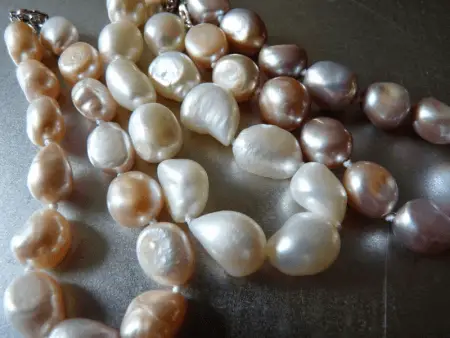However the past two decades have seen a huge increase in their quality for a number of reasons but mostly because in the mid-1990s the pearl. - Freshwater pearls can be cultivated to produce larger sizes than saltwater.
 Freshwater Vs Saltwater Pearls Difference
Freshwater Vs Saltwater Pearls Difference
Cultured freshwater pearls are pearls that are farmed and created using freshwater mussels.

Freshwater pearls vs cultured pearls. Freshwater Pearls - Freshwater pearls on the other hand are the product of mussels that. From Wikipedia the free encyclopedia A bead crochet necklace made from crochet lace sterling silver and freshwater pearls. Freshwater pearls usually are not as round as saltwater pearls and therefore less expensive.
Cultured Pearls Versus Freshwater Pearls Pearls Shown Above are All Freshwater Saltwater Pearls - Saltwater pearls including Japanese Akoya pearls Tahitian pearls and South Sea pearls are created. Either they dont know any better or theyre trying to push you to the more expensive pearl. To be clear freshwater and saltwater pearls are cultured pearls.
Freshwater Cultured Pearls Freshwater cultured pearls are the most commonly produced pearls and they are one of the most popular pearl types among shoppers and jewelry designers. Its a confusing to say the least. These pearls are produced in Japan and the United States on a limited scale but are now almost exclusively produced in China.
This suggests the fact that these pearls are smaller but also more. Saltwater pearls versus freshwater pearls. Freshwater pearls come from oysters that mature in non-saline water from lakes or ponds as opposed to saltwater from the sea.
Although akoya pearls are cultured pearls the process of nucleating them is the saltwater process and much different than freshwater cultured pearls. There are so many differences in the way saltwater and freshwater pearls are cultured produced and their differen. If playback doesnt begin shortly try restarting your device.
Freshwater pearls are usually produced in lakes or rivers in China. Pearl Shapes - Saltwater vs. There are two main types of cultured pearls.
Today cultured freshwater pearls fall into one of two categories. A cultured pearl is a genuine pearl produced by an oyster or mollusk but with human assistance. Freshwater and saltwater pearls.
Baroque Akoya are of course available but theyre rare and. This is due to their remarkable range of sizes shapes and colors plus their commercial availability at lower price points. Freshwater pearls have a much much larger variety of shapes the most common and distinctive of them being either.
How is a natural pearl created. Videos you watch may be added to the TVs watch history and influence TV. Matched on a strand freshwater pearls will lend their gentle iridescence to your complexion.
A natural pearl is formed organically when an irritant finds itself inside the oysters soft tissue muscle. Freshwater Pearls Cultured Akoya pearls are known for being perfectly round. The Biggest Difference Between Natural Pearls vs Cultured Pearls.
Where it gets confusing is some traditional jewelers will refer to freshwater pearls as cultured pearls and Akoya pearls as saltwater pearls or real pearls. Today they can be found in sizes 12mm and larger. This means that a freshwater pearl is made up of nacre all the way through.
Smaller than the Akoya pearl the cultured freshwater pearls is created without the help of a beaded nucleus. Cultured pearls are pearls that come from a mollusk whether saltwater or Freshwater varieties. Freshwater pearls are usually less shiny than saltwater pearls because their nacre is thicker.
Natural freshwater pearls are the result of a natural process while cultured pearls are the result of human. These pearls are nucleated with either a small mother of pearl bead nucleus or a square 1mm piece of mantle tissue which irritates the mollusk into forming a pearl sac and then subsequently coating the seed with crystalline nacre layers eventually forming a pearl. Freshwater Pearls Are Cultured Pearls But They Are Not Akoya The reason so many buyers distinguish cultured pearls from freshwater pearls is because cultured pearls is a trade term still used by many today to describe akoya pearls.
About half of freshwater pearls are still made with implanted mollusk tissue making smaller pearls that arent the traditional round gems but about half are now using traditional saltwater methods of implanting seed pearls into mussels to begin the process. Freshwater pearls are nucleated with tissue while saltwater pearls are bead nucleated. Saltwater pearls are typically grown in Japan and are recognized for their exceptional roundness and mirror-like luster.
The most common freshwater pearl shapes are round oval and teardrop.